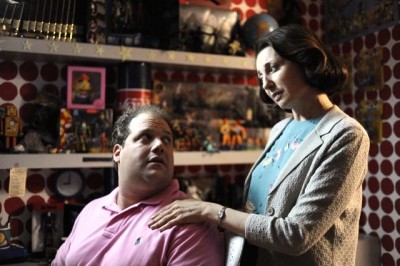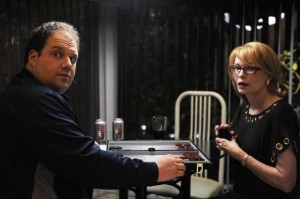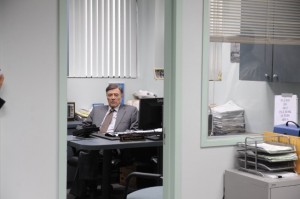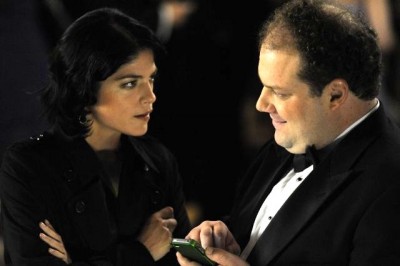
Todd Solondz makes very specialized films for a very specialized audience — or maybe it would be fairer to say that he makes films for himself and that a specialized audience finds them. This is a roundabout way of saying that his latest film, Dark Horse, is one those movies we label “not for everyone.” (Why we do that I’m not sure, since we could say the exact same thing about Michael Bay, but we never do.) Solondz makes films that are very dark, very bitter — and yet they’re thought of more as comedies than anything else. The truth is that “dark” doesn’t even get near the mark. Bleak is a better word, and the comedy is of a nature where you laugh only because there’s nothing else to be done. The line between absurdly comic and horrifyingly tragic is so thin as to be virtually nonexistent. That has perhaps never been as apparent as it is in Dark Horse — a film that tackles both the man-boy of popular culture and the idea of the “entitled generation.” While the results are uneven, that doesn’t change the fact that this is a frequently remarkable work.

The film presents the story of Abe (TV acror Jordan Gelber), a pudgy, unattractive 30-something with a receding hairline and an attitude the size of California. Abe works for his father, Jackie (Christopher Walken in high-waist pants and a spectacularly bad toupee), at a commercial real estate firm. He doesn’t really work so much as he takes up space, spreads his bad attitude and draws a paycheck. The only work we see him turn in was done by the seemingly sympathetic secretary, Marie (Donna Murphy, Higher Ground). Abe lives at home in his old bedroom with all his action figures, both ignoring and being ignored by his father, but gambling at backgammon with his mother, Phyllis (Mia Farrow). He drives around in the world’s most obnoxious car (a Hummer) — made that much worse by being bright yellow — while listening to bad pop music with lyrics that assure him he can be whatever he wants to be. He not only believes the lyrics, but thinks that such is his inborn, unearned right. What Solondz is after is the question of how Abe got this way.

When the film opens he’s at a wedding party where he meets an attractive but incredibly glum young woman, Miranda (Selma Blair, Hellboy II). He’s drawn to her — perhaps because she’s too lethargic to immediately run away from him. She’s clearly not interested, but he manages to get her phone number. It’s not long before he proposes to her — and incredibly she ends up agreeing. As you might guess, things don’t go smoothly. But then nothing in Abe’s life ever goes the way he thinks he’s entitled to have it go.

What makes the film difficult isn’t just its bitter tone, nor is it the fact that its hero is essentially unlikable — actually, no one in it is really likable. No, it’s the fact that early on, the movie hints that what we’re seeing may not always be real. It starts subtly with Marie magically appearing to counsel Abe, but soon the line between reality and fantasy is completely worn away. As with Solondz’s last film, Life During Wartime (2009), I kept being put in mind of Charlie Kaufman’s Synecdoche, New York (2008) — and not in a way that was in Solondz’s favor. But for all that, Dark Horse ought to be seen for its thought-provoking look at a character and a type of person that we seem to have come to otherwise accept. Not Rated, but with strong language and definitely not meant for children.




Do yourself a favor and check out Happiness and Welcome to the Doll House. Happiness is one of the blackest if not the blackest comedy ever made.
I’ve seen Doll House.
Did you like it?
Like strikes me as the wrong word for anything I’ve seen of Solondz’s work. Let’s say I found it interesting, but I will say it’s a long time since I saw it.
Happiness is twice the film Welcome to the Dollhouse is in just about every regard, which happens to include discomfort level. But don’t understand this to mean that I think Happiness is a masterpiece exactly, (but gosh, it really is good) since I found Welcome to the Dollhouse lacking in a number of ways.
Dollhouse feels today like an angsty product of the angst-fueled mid-nineties, whereas Happiness just plain rings all too tragically true (something I never quite felt happened in Solondz’s attempt to adopt the mindset of a 14 year-old girl in Dollhouse -but what do I know, I’m not a 14 year-old girl) and deals in levels of deviance and loneliness in such a way that it remains compelling, no matter how upsetting.
I dunno… I took a break from Solondz, but maybe I’ll catch up with both this and Palindromes.
but what do I know, I’m not a 14 year-old girl
You’re just not trying.
I havent seen Palindrones or Storytelling.
I gave it a shot but then someone told me I’d have to stand in line for the Twilight movies.
I can see that as a potential deal-breaker.
Well, this tanked something swell.
No shock there.
This was, ostensibly, the tamest of the 4 Solondz films I’ve seen and it still gave me quite enough discomfort for one rainy Monday evening.
I think that means the film succeeded.
I havent seen Palindrones or Storytelling.
The palindrome of “Bolton” would be “Notlob”!